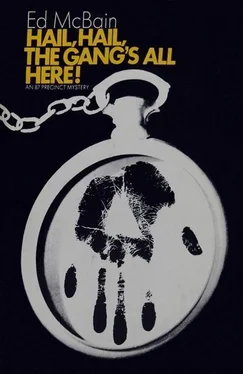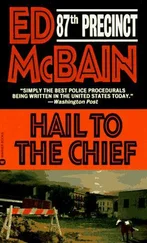The clue was everywhere around them. They just hadn’t found it yet.
The apartment was a contradiction in itself. It was small and cramped, a cubicle in a crumbling tenement surrounded by warehouses. But it was crowded with furniture that surely had been purchased in the early thirties, when solidity was a virtue and inlaid mahogany was the decorative rule. In the living room, a huge overstuffed sofa was upholstered in maroon mohair, its claw feet clutching the faded Persian rug that covered the floor. The sofa alone would have been quite enough to overwhelm the dimensions of the small room, but there were two equally overstuffed easy chairs, and a credenza that seemed to have wandered in from an ornate dining room someplace, and a standing floor lamp with a pink, fringed shade, and an ornately framed painting of snow-clad mountain peaks towering over a placid lake, and a Stromberg-Carlson floor model radio complete with push buttons and a jukebox look, and mahogany end tables on either side of the sofa, each with a tiny drawer, each carrying a huge porcelain lamp with a shade covered in plastic.
The first bedroom had a huge double bed with mahogany headboard and footboard and an unmade mattress. A heavy mahogany dresser of the type that used to be called a “bureau” when Busby Berkeley was all the rage, complete with its own mahogany-framed mirror, was on the wall opposite the bed. A taller version of it — the male counterpart, so to speak — with longer hanging space for trousers and suits and a row of drawers one atop the other for the storing of handkerchiefs, cufflinks, and sundries (Jimmy Walker would have called it a “chiffonier”), was on the window wall.
The second bedroom was furnished in more modern terms, with two narrow beds covered with simple throws, a Mexican rug hanging on the wall over them. A bookcase was on the wall opposite, alongside a closet without a door. With the exception of the kitchen and the bathroom, there was one other room in the apartment, and this room seemed to have escaped from Arthur Miller’s play The Price. It was literally packed from floor to ceiling with furniture and china and glassware and marked and unmarked cartons (among those marked was one lettered with the words “WORLD’S FAIR 1939”) and piles of books tied with twine, and cooking utensils, and even old articles of clothing draped over chairs or cartons, a veritable child’s dream of an attic hideout, equipped with anything needed to serve whatever imaginary excursion suited the fancy.
“I don’t get this place,” Carella said.
“Neither do I,” Brown said. He turned on the floor lamp in the living room, and they sat opposite each other, tired and dusty, Carella on the monstrous sofa, Brown in one of the big easy chairs. The room was washed with the glow of the pink, fringed lampshade. Carella almost felt as if he were sitting down to do his homework to the accompaniment of “Omar the Mystic” flooding from the old Stromberg-Carlson.
“Everything’s wrong but that one bedroom,” he said. “The rest of it doesn’t fit.”
“Or maybe vice versa,” Brown said.
“I mean, who the hell has furniture like that nowadays?”
“My mother has furniture like that,” Brown said.
Both men were silent. It was Carella who broke the silence at last.
“When did Goldenthal’s mother die?” he asked.
“Three months ago, I think the report said. He was living with her until then.”
“You think all this crap might have been hers?”
“Maybe. Maybe he moved it all here when he left the other apartment.”
“You remember her first name?”
“Minnie.”
“How many Goldenthals do you suppose there are in the telephone book?”
They did not even consider looking in the directories for Bethtown, Majesta, or Calm’s Point, because Gross had been heading uptown, and access to all those other sections of the city would have required going downtown. They did not consider looking in the Riverhead directory, either, because Gross had taken a bus, and bus transportation all the way to Riverhead was a hell of a slow way to go, when there were express trains running all day long. So they limited their search to the Isola directory alone. (There was one other reason they consulted just this one phone book; it happened to be the only one Gross had in the apartment.)
There were eight Goldenthals listed in the Isola directory.
But only one of them was Minnie Goldenthal — now deceased, poor lady, her name surviving in print only until next year’s directory would be published by the telephone company.
Sic transit gloria mundi.
The building in which Minnie Goldenthal had lived was a twelve-story yellow-brick structure bristling with television antennae. It was fronted by a small cement courtyard flanked by two yellow-brick pillars, atop which sat two stone urns that were probably planted with flowers in the spring, but that now contained only withered stalks. Enclosing this courtyard were the two wings of the building, and a row of apartments connecting both wings, so that the result was an architectural upside-down U facing the low, flat entrance steps to the courtyard. The mailboxes for each wing were in the entryway to the right and left. Carella checked one entry, Brown the other. There was no listing for Goldenthal, Minnie or otherwise.
“What do you think?” Carella asked.
“Let’s check the super,” Brown suggested.
The superintendent lived on the ground floor, in an apartment behind the staircase. He came to the door in his undershirt. A television set was going somewhere in his apartment, but apparently the show had not completely captured his attention, because he was carrying the Sunday comics in his right hand. The detectives identified themselves. The super looked at Carella’s shield. He looked at Carella’s ID card. Then he said, “Yes?”
“Was there a Minnie Goldenthal living here recently?” Carella asked.
The super listened attentively to his every word, as though he were being asked a question that, if answered correctly, would cause him to win a hundred-thousand-dollar jackpot.
Then he said, “Yes.”
“Which apartment?”
“Nine-D.”
“Anyone living in that apartment now?”
“Son’s still living in it.”
“Bernie Goldenthal?”
“That’s right. Don’t know why he’s living in it, mind you. Moved all the furniture out a little while after Minnie died. Still pays the rent, though.” The super shrugged. “Tell you the truth, the owners wish he’d get out. That apartment’s price-fixed. Nice big old apartment. If he gets out, they can put a new tenant in and legally raise the rent.”
“Anybody up there now?” Carella asked.
“Don’t know,” the super said. “Don’t keep tabs on the comings and goings of the people who live here. Their business is their business, and mine is mine.”
“Law requires you to have a key to all the apartments in the dwelling,” Carella said. “Have you got one for Nine-D?”
“Yep.”
“All right if we use it?”
“What for?”
“To enter the apartment.”
“That’s illegal, ain’t it?”
“We won’t tell anybody if you won’t,” Brown said.
“Well,” the super said, and shrugged. “Okay,” he said, and shrugged again. “I guess.”
Carella and Brown took the elevator up to the ninth floor and stepped into the corridor. Neither man said a word to the other, but both simultaneously drew their revolvers. 9D was at the far end of the hall. They listened outside the door and heard nothing. Cautiously, Carella inserted the passkey into the lock. He nodded to Brown, and twisted the key. There was only a small click as the lock turned, but it must have sounded like a warning shot inside that apartment. Carella and Brown burst into a long, narrow entrance foyer. At the far end of the foyer, they saw Herbert Gross and a blond man they assumed to be Bernard Goldenthal, both of them armed.
Читать дальше












